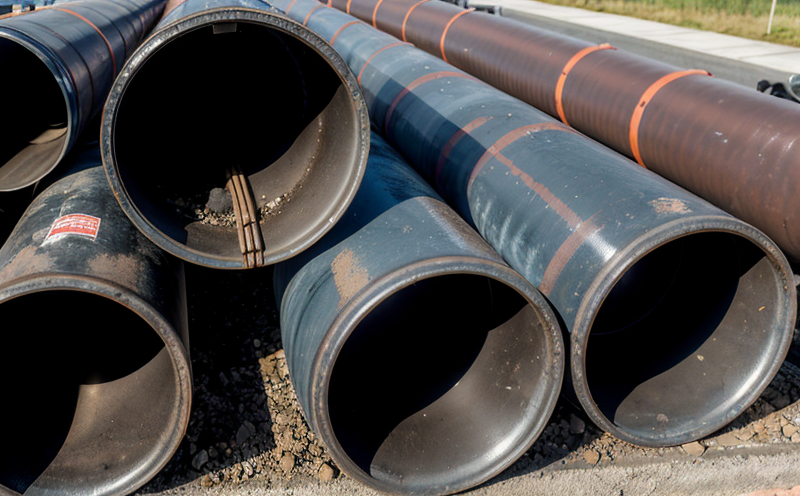ANSI AWWA C901 Performance Testing of Polyethylene Service Tubes
The ANSI/AWWA C901 standard outlines comprehensive performance testing procedures specifically tailored for polyethylene (PE) service tubes used in water distribution systems. This service ensures that the PE pipes, which are widely utilized due to their durability and flexibility, meet stringent quality standards set forth by the American Water Works Association (AWWA).
The primary focus of this testing is on the mechanical integrity and performance under various environmental conditions. Key parameters include pressure resistance, temperature tolerance, impact strength, and chemical compatibility. These tests are crucial for ensuring that the pipes can withstand typical operating pressures and temperatures in water distribution networks.
Testing procedures involve subjecting specimens to a series of controlled conditions designed to mimic real-world scenarios. This includes hydraulic testing at specified pressures over extended periods to evaluate long-term durability under static loading. Additionally, cyclic pressure tests assess the ability of the tubes to withstand repeated pressure fluctuations without failure. Environmental stress cracking tests are also conducted to ensure that the PE material is resistant to degradation caused by environmental factors such as UV exposure and moisture.
The instrumentation used in these tests includes high-pressure hydraulic equipment capable of simulating operational pressures, temperature-controlled chambers for environmental testing, and specialized mechanical testers for impact strength assessment. Each test is meticulously documented, providing detailed data on the performance characteristics of the PE service tubes.
Compliance with ANSI AWWA C901 ensures that these pipes are fit for purpose in water distribution systems, thereby enhancing the reliability and longevity of infrastructure components. This standard plays a pivotal role in promoting sustainable urban development by ensuring that materials used in critical infrastructure are robust and reliable.
The rigorous testing process not only guarantees product quality but also supports regulatory compliance, which is essential for maintaining public health and safety standards. By adhering to these stringent guidelines, manufacturers can ensure their products meet the highest industry benchmarks, thereby building trust with customers and stakeholders.
Quality managers and compliance officers responsible for overseeing water distribution projects benefit significantly from this testing process. It ensures that only high-quality materials are used in critical infrastructure, reducing maintenance costs and extending the life of these systems. R&D engineers can rely on this service to validate new formulations and designs, while procurement teams can rest assured that they are sourcing products compliant with international standards.
For quality assurance departments, having access to such specialized testing capabilities is invaluable for maintaining consistency in product performance. By leveraging ANSI AWWA C901 compliance, companies can demonstrate their commitment to excellence and reliability, fostering long-term relationships with clients and regulatory bodies.
- What does the ANSI/AWWA C901 standard cover?The ANSI/AWWA C901 standard covers performance testing of polyethylene service tubes, ensuring they meet specific mechanical integrity and environmental resistance criteria.
- Which key parameters are tested?Key parameters include pressure resistance, temperature tolerance, impact strength, and chemical compatibility under various conditions.
- What kind of instrumentation is used?High-pressure hydraulic equipment, temperature-controlled chambers, and specialized mechanical testers are among the instruments employed in these tests.
- Why is compliance important?Compliance ensures product quality, supports regulatory standards, enhances reliability, and extends the life of critical infrastructure components.
- Who benefits from this testing service?It benefits quality managers, compliance officers, R&D engineers, and procurement teams by ensuring product reliability and regulatory compliance.
- How does it promote sustainability?By using high-quality materials that are durable and reliable, this testing supports sustainable urban development through longer-lasting infrastructure components.
Scope and Methodology
The scope of the ANSI/AWWA C901 standard encompasses performance testing for polyethylene (PE) service tubes used in water distribution systems. This includes a detailed set of procedures designed to evaluate the mechanical integrity and environmental resistance of these materials under controlled conditions.
Testing involves several key components, each aimed at assessing specific aspects of the PE pipes' performance:
- Hydraulic TestingThis involves subjecting specimens to specified pressures over extended periods to evaluate long-term durability under static loading.
- Cyclic Pressure TestsThese tests assess the ability of the tubes to withstand repeated pressure fluctuations without failure, simulating real-world operational conditions.
- Environmental Stress Cracking TestsThese tests evaluate the resistance of PE materials to degradation caused by environmental factors such as UV exposure and moisture.
Each test is conducted using specific instrumentation tailored to measure performance parameters accurately. For instance, hydraulic testing requires high-pressure equipment capable of simulating operational pressures, while temperature-controlled chambers are used for environmental stress cracking tests.
The methodology ensures that all tests are performed under controlled conditions, providing reliable and repeatable results. Compliance with these standards not only enhances product quality but also supports regulatory compliance, which is essential for maintaining public health and safety standards in water distribution systems.





